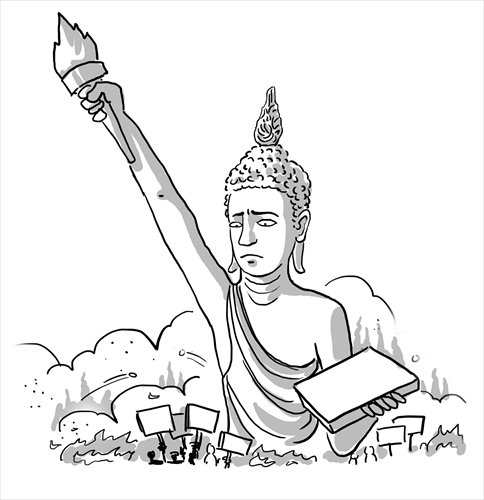Thailand’s parties have failed in democratic duty to unite nation

Illustration: Liu Rui/GT
Thailand used to be a democratic icon in Southeast Asia, but it is in a political deadlock again, which may severely jeopardize its democracy.
The recent political confrontation was triggered by a risky attempt by Prime Minister Yingluck Shinawatra's government to pass an amnesty bill, which was criticized as a botched attempt to open the door for the return of ousted former prime minister Thaksin Shinawatra, Yingluck's older brother.
Although Yingluck dissolved the parliament and called for new elections in early February, 2014, to calm the current crisis, opposition leader Suthep Thaugsuban firmly rejected the proposal. Instead, Suthep called for power to be transferred to an unelected "people's council," which he claimed would fix the flaws in various existing laws before general elections.
While most political entities around the world are struggling for more democracy, Thailand seems to be going in the opposite direction, where not only a democratically elected government is rejected, but calls are made for general elections to be postponed.
Thai society has become politically divided into "Red Shirts" and "Yellow Shirts," supporters of the ruling Pheu Thai Party (PTP) and the opposition Democrat Party respectively.
The "Red Shirts" are predominantly poor farmers and workers from outside Bangkok, while the "Yellow Shirts" are mainly urban middle class and pro-royalist elite groups based in southern Thailand and Bangkok.
Thailand ranks among the most unequal nations in Asia. The huge income gap between the rich and poor shapes Thai society into a pyramid structure, in which the relatively poor "Red Shirts" represent the 70 percent majority who welcome populist policies, while the "Yellow Shirts" are the 30 percent elite.
Therefore, based on the one-person-one-vote principle, it is not surprising that the popular PTP, along with its predecessor the People's Power Party, and Thaksin's original Thai Rak Thai Party have comfortably won most elections since 2001. That is also why the opposition party has rejected the proposed February elections, in which it expects to lose again.
A new balance between the three traditional power pillars, namely the bureaucracy, the military and the monarchy, is the key to ending political chaos in Thailand, but how?
Instead of another coup, Thailand's influential military has confirmed its support for "fair and clean" elections in February.
However, if the politically polarized Thai society cannot reach a real reconciliation and a general consensus on democracy, no future election results will be sustainable, because neither "Red" nor "Yellow" will work with each other.
What about one single coalition government including even the opposition party as a transitional solution to quell social hatred? It seems to be a silly idea, but has worked in other countries such as Greece and Albania.
However, do the Thai ruling and opposition parties have the political courage and wisdom to do this? This is unlikely, due to their different but deeply vested interests, as well as the influence of the military and monarchy.
Thailand may not be lacking in democratic elections, but Thai political parties seem to lack understanding of a good democracy, where responsible and clean political parties should try to unite the whole of society and maximize the interests of all citizens, rather than just those of certain groups.
The author is an investment analyst and independent commentary writer based in Singapore. opinion@globaltimes.com.cn